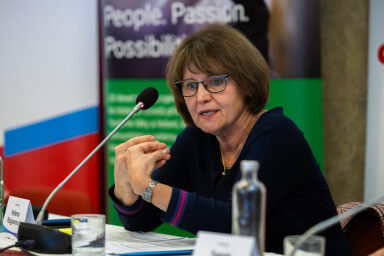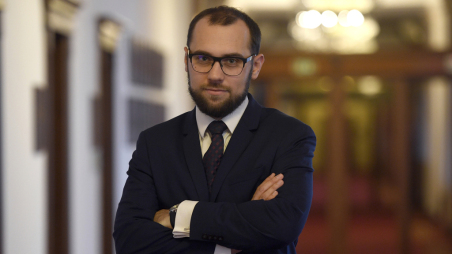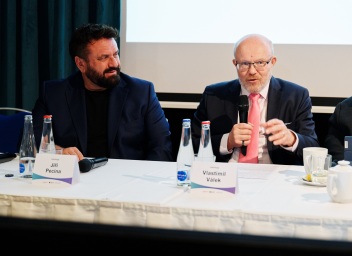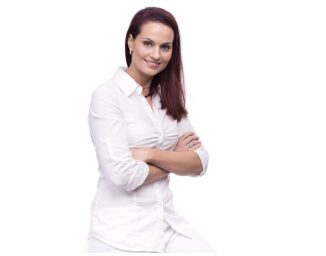Years spent hunched in front of a computer or a mobile screen are not good for your health. And it’s not just a habit that kids from big cities adopt, but a trend that is spreading to every corner of the country. Even kids from rural areas aren’t spared. Meanwhile, the problem of childhood obesity is becoming more and more pressing, and children skipping their gym classes are not making it any better. How to get kids to exercise more? And does success in elite sports contribute to the overall health of the population? These were some of the issues discussed by the participants of the first panel of the Healthcare Journal’s Economics of Prevention conference – Czech Health Minister Vlastimil Válek, State Secretary of the Slovak Ministry of Health Ladislav Slobodník and former professional football player Jan Koller.
„The situation is bad. Childhood obesity is on the rise, and you can see it even in rural areas where people otherwise lead healthier lifestyles. Sport is competing with computers and mobile phones,“ said Jan Koller, the all-time top scorer of both the Czechoslovak and the Czech football team, assessing the relationship of today’s youth to physical activity. He lamented the fact that families nowadays spend their free time in shopping centers rather than outdoors. „The foundation is built during childhood and the biggest role models for children are their parents,“ Koller said, adding that this is also why parents should take an interest in active sport and healthy lifestyle in general – their children will simply copy it from them.

Ladislav Slobodník, a representative of the Slovak Ministry of Health, sees it the same way. „Children under the age of six, pre-schoolers, move in an ideal way, that is in the way that they are genetically determined to. Then there is a period when they spend more and more time sitting down and that is where the problems with movement begin… Perhaps we should focus on children under the age of ten, which is when movement patterns are formed in the spinal cord,“ he said about the importance of childhood habits on behavior and self-management later in life.

Health Minister Vlastimil Válek also agrees that attitude towards health is formed in early childhood. „If there are no physical activities at school or if a child is afraid of movement because, for example, he or she gets a B in exercise, this will naturally discourage people from playing sports,“ he said, adding that the number of children who avoid PE for some reason is on the rise. Thus, physical fitness of the population is declining over time. According to the minister, it’s a paradox as more and more Czechs are watching sports broadcasts and thus showing an interest in sport. However, this is not reflected in their own physical activity.

Consistency is key
That’s why the minister supports greater accessibility of sport. „Children under 15 deserve financial support to move as much as possible. Not only should they have this opportunity in schools, but they should also have freely available playgrounds for various sports. Tourist clubs undoubtedly deserve support as well,“ said Válek. As far as professional sports are concerned, he said that the purpose of support there is somewhat different, namely, among other things, raising national self-esteem. He added that research from abroad has not shown that the millions invested in top-level sport have been reflected in the health of the population. „It is important that we have top athletes, but these seemingly easy paths are not proving to be the right ones,“ the minister summed up. He also mentioned the positive effects of mobile apps that motivate users to exercise.

When it comes to specific physical activities that children and adults can do to stay fit, Válek recommended those that engage the maximum amount of muscles and do not overload the joints. Such activities, he said, include cycling, swimming and running, but also regular walking. That point was further supported by the Slovak representative Slobodník, who warned against people being too ambitious when first starting to exercise. „There is nothing worse than when someone doesn’t do anything and then suddenly makes a bet with someone else that they will run a marathon… You always need to go slowly. Consistency is what’s important,“ he said.

Koller, a former professional football player, said that even after his sports career ended, he continues to keep fit even at the age of 51. „I thrive on hockey… I also play padel, which is a new sport similar to squash and tennis. It’s a great sport even for beginners,“ he said, adding that he prefers to avoid football – the sport for which he became most famous – given its physical demands.
-fk-
Foto: Radek Čepelák
Thanks for the support of the conference go to the General Health Insurance Company of the Czech Republic, Health Insurance Company of the Ministry of Interior of the Czech Republic, General Health Insurance Company of the Slovak Republic and the companies Tiscali Media, ALK, Ewing, EUC, AKESO, Sprinx, National Sports Agency and Dukla Sports Club.
Mohlo by vás zajímat


















